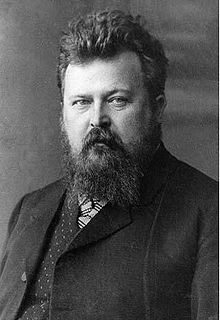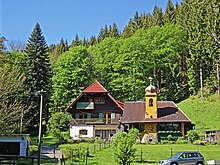Hans Kehr
Johannes Otto Kehr , called Hans Kehr (born April 27, 1862 in Waltershausen , † May 20, 1916 in Berlin ), was a German surgeon , founder of the German biliary tract surgery and non-fiction author .
Life
He was the son of the school council, reform pedagogue, seminar director and writer Carl Kehr . After attending school, he studied medicine in Freiburg, Halle, Jena and Berlin. In 1885 he passed his state examination and was awarded a Dr. med. PhD . In 1886/87 he was an assistant doctor at the private clinic of Privy Councilor Dr. Meusel in Gotha , who “planted the love of surgery in his heart”. In 1887/88 he continued his education in Vienna (courses with Theodor Billroth , the "father of modern abdominal surgery") and in Berlin before settling in Halberstadt for many years in 1888 as a "specialist in surgery and orthopedics" . In 1890 Kehr carried out his first and successful biliary surgery autodidactically without having attended one beforehand. In 1890 his well-known private clinic was also founded in Halberstadt. He became a well-known gallbladder surgeon , the specialty is the founder in Germany and one of the first surgeons entirely on an organ specializing have. Kehr carried out around 2,300 such operations. He had his own fee system: a rich man had to pay to save his life in such a way that free treatments were possible for less well-off. In 1896 he was appointed professor and in 1905 he was appointed to the Privy Council. After 23 years of successful activity, Kehr moved to Berlin at the end of 1910, where in his final years he generated public interest through numerous publications. He found relaxation in Edelmannsgrund near Gehlberg in Thuringia, where he had a summer residence built in 1908, the "little bell in the valley". He was very generous towards the residents of Gehlberg. Years after his death there were still barbecues for the children of the village every year. He died of complications from blood poisoning that he contracted during an operation. He had refused an arm amputation because he could not imagine life without his job. The body was cremated in Gotha according to the wishes of the deceased and found its final resting place on his property in Gehlberg, where the tomb still exists today. In commemoration, a lookout rock northeast of Gehlberg on Bettelmannskopf was renamed "Hans-Kehr-Stein". For a number of years it has been adorned with a plaque donated by a medical symposium in Suhl. Hans Kehr was a passionate admirer of Richard Wagner , had personal contacts with Cosima and Siegfried Wagner , founded a "Wagner Circle of Friends" and initiated several Wagner festivals in Halberstadt ("Klein-Bayreuth").
The longtime president of the Monumenta Germaniae Historica , Paul Fridolin Kehr , was an older brother.
Honors
- Hans Kehr memorial stone in Gehlberg in Thuringia
- Hans Kehr Symposium every two years in Oberhof or Suhl
Fonts (selection)
- Surgical treatment of gallstone disease. Berlin 1896.
- The technique of gallstone surgery practiced in my clinic. Munich 1905.
- The practice of biliary tract surgery in words and pictures. 2 volumes. Munich 1913 (Kehr's life's work).
- Biliary tract surgery. Stuttgart 1913.
literature
- Volker Klimpel: The implementation of new biliary surgical operating principles by Hans Kehr (1862–1916) in the period from 1890 to 1916. In: Contributions to the university and scientific history of Erfurt. Vol. 21 (1987/88), pp. 221-242.
- Walter Pincus: Hans Kehr. In: Central German Life Pictures. Volume 2: Pictures of the 19th Century. Magdeburg 1927, pp. 469-476.
- Bernd Schneider: Hans Kehr in his time. In: Ärzteblatt Thuringia. 4/2009, pp. 275-279
Individual evidence
- ↑ Ernst Kern: Real and supposed progress in surgery. In: Würzburg medical history reports. Volume 9, 1991, pp. 417-429; here: p. 420.
| personal data | |
|---|---|
| SURNAME | Kehr, Hans |
| ALTERNATIVE NAMES | Kehr, Johannes Otto (full name) |
| BRIEF DESCRIPTION | German doctor |
| DATE OF BIRTH | April 27, 1862 |
| PLACE OF BIRTH | Waltershausen , Thuringia |
| DATE OF DEATH | May 20, 1916 |
| Place of death | Berlin |

